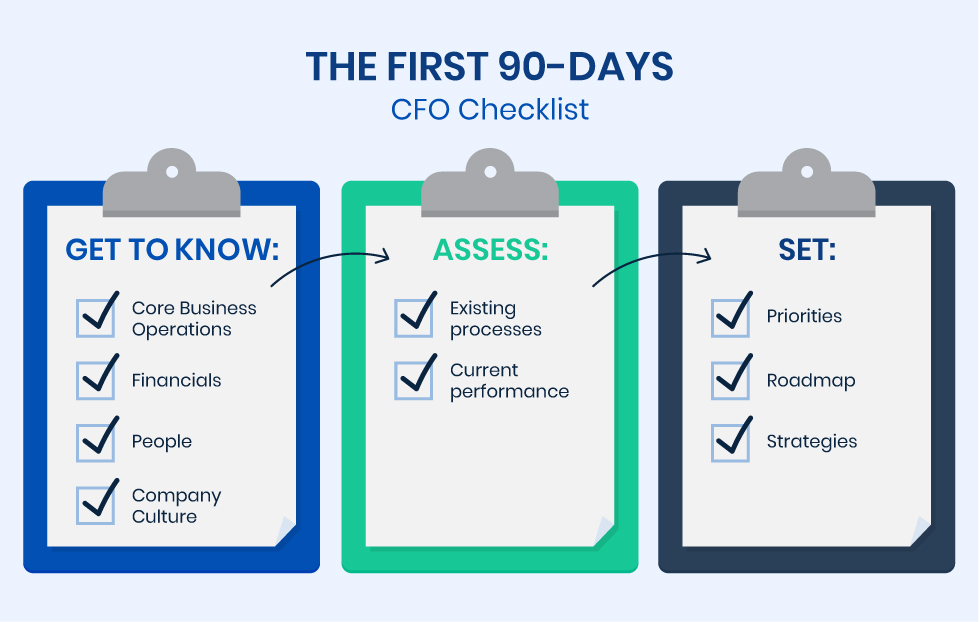No one knows a company’s financial health better than the CFO. As the head of finance, the CFO is responsible for ensuring that the company is meeting its financial goals.
The role includes managing budgets, overseeing accounting and financial reporting, and ensuring compliance with regulations. To effectively carry out these duties, the CFO needs to have a clear understanding of the company’s finances.
If you are a new CFO, there are several things you need to do in your first 90 days on the job to get up to speed and ensure that your department is running smoothly. This includes getting acquainted with company financials, building relationships with stakeholders, setting goals and benchmarks, creating and reviewing departments policies and procedures, and setting strategy for the future. By taking care of these essential tasks in your first few months on a job, you’ll be well on your way to a successful tenure as CFO.
To help you get started, we’ve put together a handy checklist outlining the most important things to focus on in your first few months on the job. Keep reading for more details and check out our essential CFO checklist to make sure you’re on top of your game!
CFO Checklist for The First 90-Days:
- Understand The Business
- Get Acquainted with Company Financials
- Assess Existing Processes and Current Performance
- Get To Know People and Culture
- Set Priorities
- Create a Roadmap
- Develop Strategies

1. Understand The Business
As the CFO of a company, you are responsible for ensuring its financial health. To do this you need to have a deep understanding of the business and its various revenue streams.
In your first 90 days on the job, you must take the time to truly get to know the company. This means meeting with key stakeholders, reviewing financial statements, and doing your research. You need to get to know the business, the team, the products, and the customers.
Only by taking the time to understand the business can you make informed decisions about where to allocate resources and how to best grow the company. While it may seem like there is a lot to do in your first 90 days, remember that understanding the business is essential to ensuring its long-term success.
2. Get Acquainted with Company Financials
The most important task in your first 90 days on the job is to get familiar with financials. By taking the time to get a comprehensive view of the company’s financials, you can ensure that you are making decisions that are in the best interests of both the business and its shareholders.
This will allow you to gain a clear understanding of the company’s current financial situation and identify any areas that may need improvement. Getting to know the basics will help you develop a better understanding of how the business operates and what changes may need to be made to improve profitability, identify potential problems and avoid them in the future. For example, if you see that the company is not generating enough revenue, you can take steps to increase sales or reduce expenses.
Finally, getting to know the financials can also help build relationships with other members of the executive team and have meaningful conversations with the CEO and other key players about the company’s direction and how to improve its financial performance.
3. Assess Existing Processes and Current Performance
Part of understanding a company’s financials is to assess its existing processes. Several different factors need to be taken into account when conducting this assessment, including efficiency, accuracy, and compliance, but it will also help to identify any potential risks.
Not only will you be responsible for the financial health of the company, but you will also be tasked with implementing any changes that need to be made to existing processes. You need to make sure that the company is operating as efficiently and effectively as possible, and determine which processes are working well and which ones need to be improved. Take a close look at the financial statements, and review operations and financial flows. This analysis can also help you identify areas where costs can be reduced or revenue can be increased.
With detailed assessment, you can develop a road map for moving forward and ensure that any changes that are made are based on solid data and that the company is on track for success.
4. Get To Know People and Culture
Being a CFO is a lot different than being an accountant. As s CFO you are responsible for providing strategic direction and leadership.
Yes, your first 90 days will be dynamic, you will need to get up to speed on the company’s financials, business model, and competitive landscape, but it is essential that you also get to know the company’s people and culture.
After all, the financial health of a company depends heavily on the engagement and productivity of its employees. It will take some time to understand their strengths and weaknesses and to develop relationships with key stakeholders. By getting to know the people and culture, you can identify any potential issues that could impact employee morale or motivation, and gain a better understanding of the company’s core values and how they drive decision-making.
Ultimately, this knowledge will be invaluable when it comes time to make difficult decisions about the company’s future. Knowing people and culture will help you make better decisions about where to invest limited resources.
5. Set Priorities
Your new role as a CFO means you will be tasked with setting the financial priorities of your company. This can be a daunting task, but it is important to remember that you only have a limited amount of time to make an impact. In your first 90 days on the job, you need to focus on establishing priorities and putting in place systems and processes that will allow you to achieve your goals and develop a strategic plan for the future.
One priority should be to gain a deep understanding of the financial condition of the business. You will need to review past financial statements, understand current cash flow and working capital needs, and evaluate risk exposure. Another priority should be to develop a budget and forecasting process that can provide visibility into future cash needs.
You should also focus on building relationships with key stakeholders, such as shareholders, employees, and suppliers, and establish yourself as a trusted advisor. These relationships will be essential as you work to navigate the challenges of the current economic climate.
6. Create a Roadmap
Creating a roadmap will give you a chance to put your own stamp on the organization for the first time. It’s your first contribution, your entry point. It will help you get a lay of the ground, identify priorities, and set your strategic course.
The roadmap should include an analysis of the current financial situation, a review of the company’s financial goals, and your plan for how you will achieve those goals. It should also identify any potential risks or challenges that could impact the company’s finances.
So don’t be afraid to roll up your sleeves and get started on your roadmap as soon as possible. It will be one of the best investments you can make in your new role.
7. Develop Strategies
Once you have a good grasp of the company’s financial situation, you can begin to develop strategies for improving it. This may involve implementing new accounting standards, making changes to organizational structure, seeking new sources of funding, or even automating your accounting processes.
Maybe your new strategies will include developing new budgeting and cost-saving measures, increasing revenue streams, identifying areas of cost savings and reducing expenses, creating accurate financial statements, or establishing robust internal controls. Regardless of what approach you take, it is essential that you act quickly and decisively to ensure the financial well-being of the company.
You need to be proactive in developing strategies that will ensure long-term financial stability for the business, and you should work closely with other members of the executive team to ensure that all departments are aligned with the company’s financial goals.
Starting as a CFO can be challenging, but it’s also an opportunity to make your mark on the company. Get to know the business, people, financials, and processes inside and out, and it will help you set goals and strategies that will move the company forward. While it may seem like there is a lot to do, it is important to focus on the most essential tasks during your first 90 days on the job to hit the ground running and make a positive impact on the company’s bottom line.
If you want to digitally transform your new finance department, DOKKA can help automate AP processes so you can focus on more important tasks.




